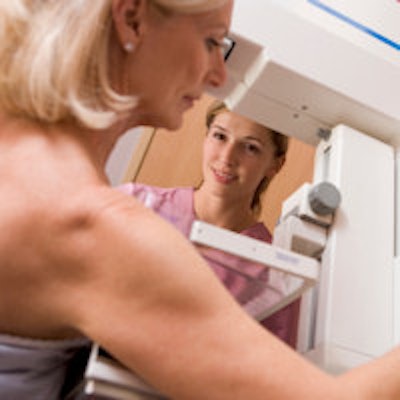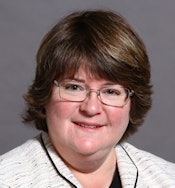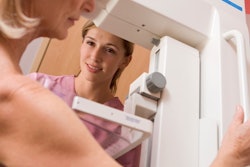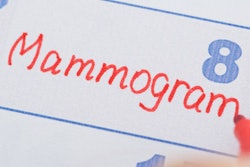
Prior false-positive mammograms do not keep women from complying with screening mammography guidelines, according to a new study published online May 24 in the Journal of the American College of Radiology.
The finding addresses what some call a potential "harm" of mammography: the undue anxiety women may experience when they receive a false positive, researchers from the University of Colorado wrote. Although this anxiety is real, it doesn't seem to outweigh the benefit women believe they gain with regular mammography exams.
"Having a false-positive mammogram is not a significant deterrent to compliance with screening mammography guidelines," lead author Dr. Lara Hardesty told AuntMinnie.com. "Yes, false positives are scary, but they're not so frightening as to make women avoid screening."
Awash in anxiety?
For the study, Hardesty and colleagues included 9,385 consecutive, nonbaseline mammograms taken in women older than 40 between December 2012 and December 2013. The team analyzed differences in time between mammograms by prior recall status, adjusting for exam location (outpatient office versus a mobile unit) and age (JACR, May 24, 2016).
 Dr. Lara Hardesty from the University of Colorado.
Dr. Lara Hardesty from the University of Colorado.At the time of the study, the American College of Radiology (ACR), the Society of Breast Imaging (SBI), the American College of Surgeons (ACS), the American College of Obstetricians and Gynecologists (ACOG), and the American Cancer Society (ACS) recommended annual screening mammography starting at age 40, while the U.S. Preventive Services Task Force (USPSTF) recommended biennial exams in women 50 and older.
Although the University of Colorado's breast imaging practice recommends that women follow the ACR screening mammography guidelines, many of its patients have referring providers who advise them to follow the USPSTF guidelines, so the group controlled for compliance with both sets of recommendations, Hardesty and colleagues wrote.
Despite previous studies suggesting that false-positive mammograms create enough anxiety to deter women from having subsequent exams, this research found that the majority of women who received false-positive results on prior mammography continued to participate in screening protocols: Of screened women who were recalled on their most recent prior mammogram, 54.4% were compliant with the ACR's guidelines and 85% with the USPSTF's guidelines. In addition, the women who were not compliant with either the ACR's or the USPSTF's recommended screening intervals were no more or less likely to have been recalled on their most recent mammogram, the group found.
Lost to follow up?
One of the study's limitations is that only women who presented for screening mammography were included, the authors conceded: The study design prevented the team from knowing the number of women who had false-positive mammograms and chose not to undergo screening mammography again.
However, this limitation doesn't seem to play out in the results, the group wrote. For it to be an issue, a significant number of women who had false-positive mammograms would have had to dropout from participating in subsequent screening mammography. But the study found that 11.8% of women were recalled on their prior mammogram -- a percentage consistent with the false-positive rate recommended for screening mammography as well as the expected recall rate, according to Hardesty and colleagues.
"If a significant number of women who had a prior false-positive mammogram failed to participate in subsequent screening, this rate would be lower than the expected recall rate," they wrote.
The researchers hope their study will help create a more realistic perspective on the downsides of mammography.
"We want to get the word out that having a false-positive mammogram is not a significant deterrent for women's screening compliance," Hardesty told AuntMinnie.com.




















